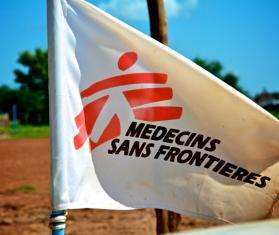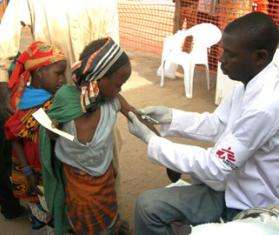NEW YORK/GENEVA, JUNE 12, 2023—As Gavi, the Vaccine Alliance, prepares for tomorrow’s Global Vaccine Impact Conference, the international medical humanitarian organization Doctors Without Borders/Médecins Sans Frontières (MSF) is calling on it to ensure that all children five years old and younger who have missed some or all of their routine childhood vaccines have the opportunity to receive them.
Gavi was set up 20 years ago to increase access to vaccines for the world's poorest countries and mainly supports vaccination for children up to age one. This leaves behind millions of children under five who desperately need access to vaccination. To help ensure all children under five can access lifesaving vaccines, Gavi must urgently remove barriers. For example, they must waive their co-financing requirements for countries and areas with fragile health systems that can’t afford to contribute to vaccination.
While the number of children who haven’t received any routine vaccinations decreased globally between 2010 and 2019, disruptions to health systems during the COVID-19 pandemic fueled an historic global backslide in childhood immunization. Between 2019 and 2021, 67 million children missed out on routine vaccination, 48 million of whom were children who did not receive a single routine vaccine. Even considering pre-pandemic progress, far too many children have missed out on routine vaccinations. This is especially true for children in fragile and conflict-affected settings like those in which MSF works; in 2018, approximately 40 percent of children living in these settings had not been vaccinated.
For more than five decades, MSF has been vaccinating children as part of routine vaccination campaigns and in response to disease outbreaks in some of the world’s most challenging humanitarian contexts. In 2022, MSF vaccinated approximately 2.7 million children under the age of five in medical projects around the world.
Dr. Sharmila Shetty, vaccines medical advisor for MSF’s Access Campaign, said in advance of Gavi’s conference:
“If Gavi wants to truly fulfill its objective of ‘leaving no one behind with immunization,’ then it should be doing much more to prioritize getting vaccines into the arms of children up to at least five years of age.
“The world is at a critical point. We are already seeing the reemergence of outbreaks of preventable and previously controlled diseases like measles, polio, diphtheria, and meningitis—making it all the more urgent for Gavi to remove any barriers within its remit that are blocking the broadening of vaccine coverage for unprotected children.
“One of the barriers is, of course, cost, especially to reach the approximately 11 million under- and un-vaccinated children living in fragile or conflict-affected countries. With many countries in humanitarian crisis already cash-strapped and struggling to keep their health systems functional, we’re worried that paying for vaccines for children up to at least five who have missed some—or all—of their routine vaccinations may be an impossibility.
“To give children living in these countries the opportunity to catch up on their vaccines, we strongly urge Gavi to waive requirements to co-finance additional vaccines for countries and areas with fragile health systems or those in humanitarian crisis.
“We should not be letting any child suffer or lose their life simply because routine vaccines are not available to them. If Gavi were to waive co-financing requirements, that would be a major step towards ensuring equitable access to vaccines for all children everywhere.”




